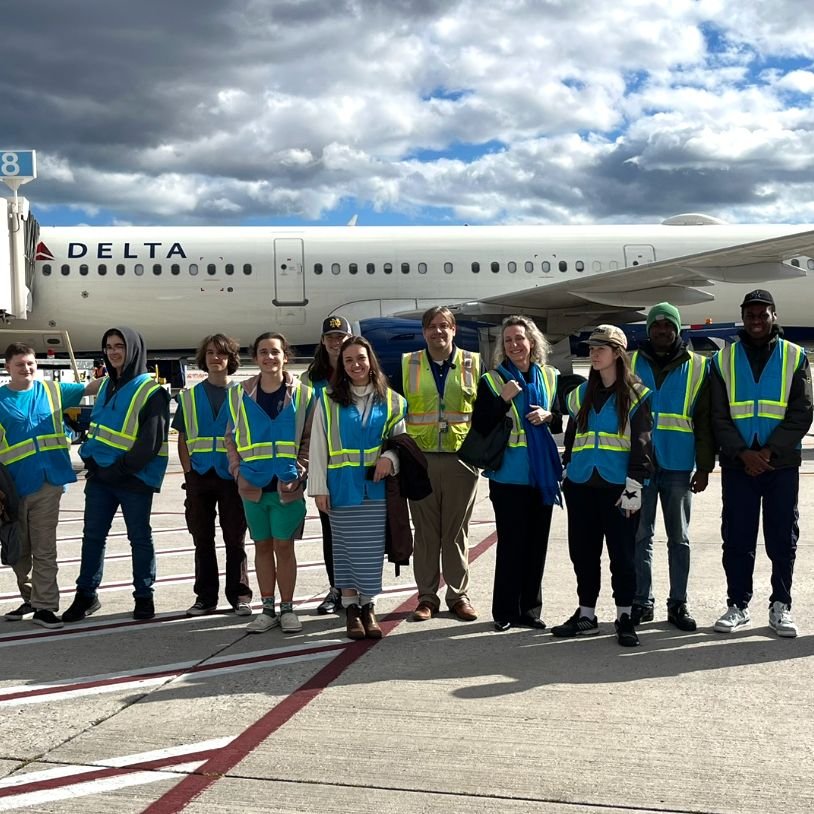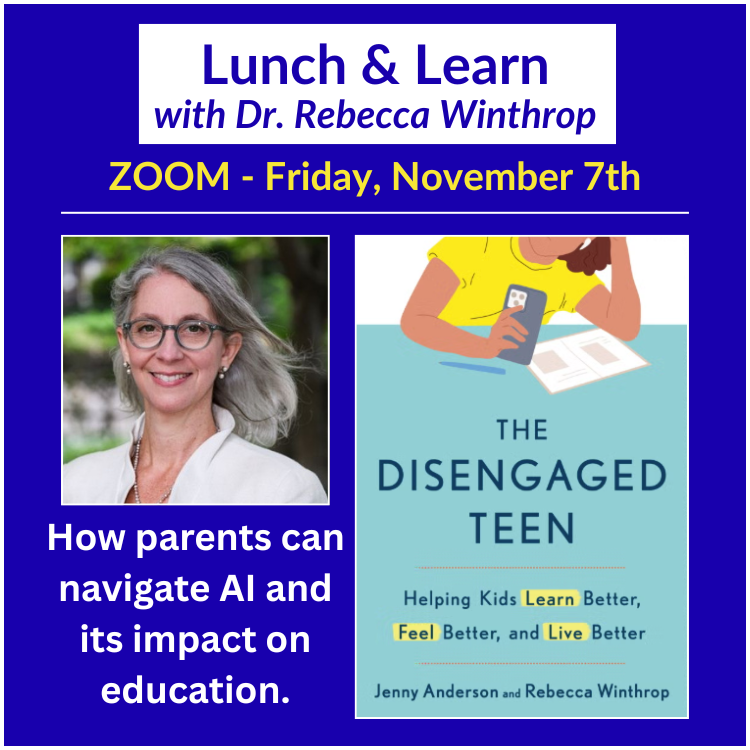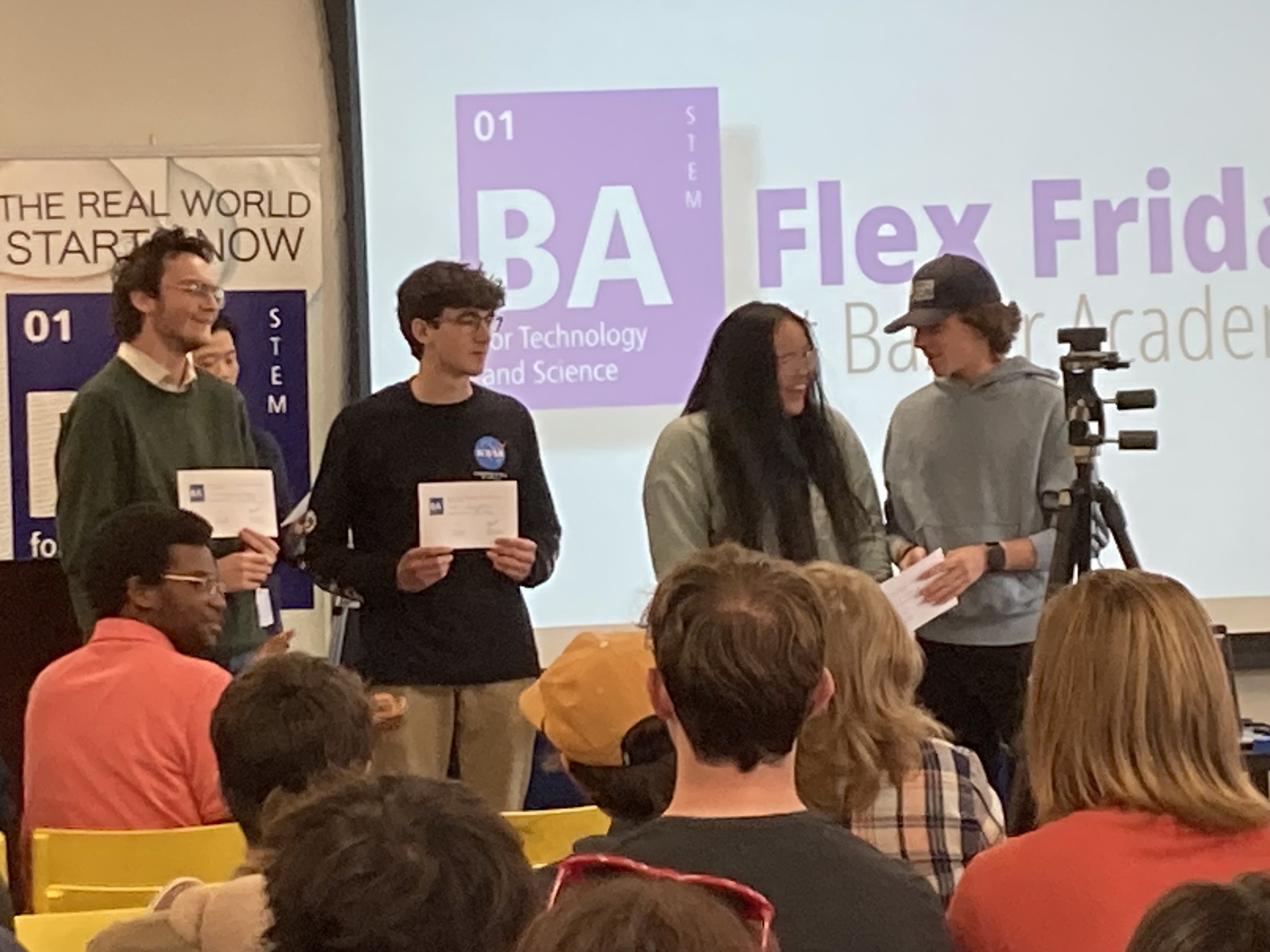
Last week offered a clear example of the value of Baxter’s community partnerships. Our Drone Cluster—led by faculty member Lauren Dickinson —visited the Portland Jetport, where staff generously welcomed our students, provided lunch, and offered a behind-the-scenes look at airport operations. Despite the government shutdown, the Jetport team made space for our students to learn, ask questions, and explore careers essential to a functioning transportation system. Their expressed interest, time and support were greatly appreciated.
Experiences like this demonstrate why Baxter’s connections in the community are so special. Students were able to connect their academic work to real professional environments, see pathways within the aviation and transportation sectors, and understand how accountability and rigor relate directly to workforce expectations. This is not inquiry for the sake of inquiry—it is preparation for meaningful careers and engagement with the community.
The Drone Cluster’s current projects include a search and rescue drone designed to assist emergency responders, a water-sampling drone that can test remote waterways, and a vaccine-delivery drone exploring potential solutions for rural healthcare access. Two students are also developing a “Drone Camp,” a summer program that introduces younger learners to the fundamentals of drone technology.
These initiatives reflect Baxter’s Real World Now disposition of learning: what is practical, relevant, and connected to community needs. Through hands-on engineering, collaboration with professionals, and exposure to emerging technologies, students are building both technical competency and an awareness of the broader systems they may one day help shape.
The visit to the Jetport underscored a belief we here at Baxter sharel: partnerships and real-world engagement accelerate learning. We hope that experiences will remain central to helping students connect their work to the opportunities and responsibilities that define the future workforce. Thank you to Paul Bradbury, CEO, for making this possible.
#RealWorldNow #STEMEducation #DroneInnovation #AviationCareers #EducateMaine #TransportationTechnology #HandsOnLearning #BaxterAcademy #FutureOfWork #EdLeadership #CommunityPartnerships

At Baxter Academy for Technology and Science, education has never been confined to the classroom—it is an endeavor that unfolds in real time, in the real world. Each Friday, our students engage in that space through Flex Friday, dedicating 20% of their time to tackling authentic challenges that matter deeply to their communities.
This year, two students are collaborating on a problem that hits especially close to home: the ongoing threat of PFAS contamination in Maine’s soil and water. These “forever chemicals,” persistent and invisible, have quietly reshaped conversations around health, agriculture, and environmental safety. In response, our students are researching and developing detection prototypes, analyzing contamination patterns, and collaborating with local partners to design solutions that could serve Maine’s rural regions—transforming scientific inquiry into civic action. Their initial focus is on the Brunswick Naval Air Station.
This is the essence of Real World Now, Baxter’s campaign to illuminate the power of hands-on learning rooted in purpose. Our students are not simply studying subjects; they are engaging with the world as emerging engineers, researchers, and citizens of a democracy. Whether they’re constructing water-filtration systems for Guatemalan villages, designing rugged wheelchairs for uneven terrain, or experimenting with AI-powered data tools, the throughline remains the same: prioritizing positive community impact through STEM-based solutions. In every lab, workshop, and classroom conversation, we hope our students will see themselves as solutionaries—young people capable of both understanding complexity and responding to it with ingenuity and care.
That ethos has never been more essential. Maine’s economic and technological landscape is shifting rapidly as artificial intelligence and advanced manufacturing redefine what it means to work, lead, and create. Supporting innovative education in Maine means preparing students not just to adapt to that change, but to help guide it. Schools like Baxter—nimble by design and deeply connected to community—are uniquely positioned to cultivate the next generation of thinkers and builders who can blend human empathy with technical fluency. By investing in programs like Flex Friday, our partners—businesses, universities, and civic organizations—help students acquire the skills, confidence, and moral imagination that the future demands.
Innovation does not happen in isolation. It flourishes when educators, families, and industry come together to create opportunities that mirror the challenges of our time. As we continue to expand our Real World Now initiatives, we see a powerful truth emerging: the problems facing Maine and the world—PFAS, climate resilience, AI ethics—are not separate from the classroom; they are the classroom. When we pull together around that shared purpose, we ensure that our young people are not merely preparing for the future—they are already shaping it, one Flex Friday at a time.
#RealWorldNow #STEMEducation #MaineInnovation #FutureOfWork #AIandEthics #EnvironmentalScience #HandsOnLearning #FlexFriday #PFASResearch #BaxterAcademy #EducationForImpact #CommunityInnovation #Solutionaries #HumanCenteredTech
This post was edited for spelling/errors by AI.

Artificial Intelligence has quickly woven itself into everyday life. It helps organize us, makes us more efficient, expands our capacity and our accuracy, and drives innovation. Many of us are already using it at work, often without realizing it. The pace of its adoption has been breathtaking — and like any powerful new tool, it inspires both wonder and caution.
At Baxter, curiosity and problem-solving are in our DNA. We are a STEM-focused community, but more than that, we are a community of question-askers. When something new captures our attention, we want to understand it and ask what it means for the world around us. AI has sparked exactly that kind of thinking. What is the right way to use it? Where might it be most beneficial? And when might it be less than ideal — and why?
Those questions have shaped rich discussions among our teachers, students, and families. We’ve been listening to a range of voices and perspectives to better ground our understanding. One that’s recently risen to the top is Jonathan Haidt, the social psychologist behind The Anxious Generation. His research on youth mental health and technology use has reshaped how many parents think about the age children first receive smartphones. Now, Haidt is turning his attention to AI — warning that it could prove even more addictive and disruptive than social media. His recent interview in USA Today is worth a thoughtful read.
Still, Baxter has always embraced innovation. We believe in the power of new tools when used with humanity and purpose. This summer, we had the privilege of welcoming Dr. Kate Moore, a research scientist at MIT’s STEP Lab and Education Arcade, who works with educators nationwide to explore how AI can be taught responsibly — both as a technical system and as an ethical landscape. Her visit sparked ongoing classroom conversations, exemplified by our own Ruby Peterman ‘21, Computer Science teacher and Harvey Mudd graduate. Ruby is guiding students to think critically about how AI functions, what it can do, and where it should be used with care. Around the same time, an article in Wired caught our attention — it explored how AI is reshaping the creative instincts of young people, raising both possibilities and questions that feel particularly close to our mission.
Now, we’re extending that conversation beyond our walls. On November 7, Baxter will host Dr. Rebecca Winthrop, co-author of The Disengaged Teen and senior fellow at the Brookings Institution, for a virtual Lunch & Learn on parenting and AI. Her recent New York Times article, “Parents, Your Job Has Changed in the A.I. Era,” captures what so many of us are feeling — that technology is evolving faster than our ability to fully understand it, and that our role as adults is to guide children not just in how to use these tools, but in how to live well alongside them.
AI is changing how we work, how we think, and how we learn. But it also challenges us to stay grounded in what makes us human — empathy, curiosity, and connection. As educators and parents, our responsibility is not just to prepare students for the tools of the future, but to help them build the judgment and ethical awareness to use those tools wisely.
We hope you’ll join us for this important conversation with Dr. Winthrop. Together, we can continue to ask the right questions — and model for our students what it means to lead with both curiosity and conscience.
*Register Here for November 7th, 12pm by ZOOM.
#BaxterAcademy #STEMEducation #AIinEducation #RealWorldNow #ParentingInTheAIEra #EthicalAI #FutureofLearning #InnovationWithPurpose #MaineEducation #RebeccaWinthrop #BrookingsInstitute

By Anna Klein-Christie, Executive Director
At Baxter Academy, we believe learning should be alive — full of curiosity, challenge, and connection to the real world. That’s why programs like our Chess Initiative have become such a powerful part of our STEM mission.
At Baxter, students play chess the old-fashioned way — on a real board, face to face, with all computers put away. In that analog space, something remarkable happens: students slow down. They read each other’s expressions, anticipate outcomes, and think several moves ahead. Each match becomes a quiet laboratory for experimentation and analysis — a living model of the scientific method that demands focus, logic, and creativity.
But chess goes beyond logic. It teaches perseverance, concentration, and resilience. Every student learns that progress comes through trial and error, that reflection is the key to mastery, and that failure is simply the next step toward understanding. These are the very habits of mind that drive innovation in labs, workshops, and classrooms. Chess strengthens core STEM fluencies — spatial reasoning, pattern recognition, sequencing, and data analysis. A strong chess player is a systems thinker: always looking ahead, identifying dependencies, and anticipating outcomes. In other words, a future engineer, coder, or designer in the making.
In an era defined by generative intelligence, chess also anchors students in critical thinking. While AI can process thousands of moves in an instant, it cannot replicate the human capacity for judgment, creativity, and ethical reasoning. When our students play chess, they’re not only sharpening their minds — they’re practicing the essential skill of thinking for themselves in a world increasingly shaped by algorithms. It’s a reminder that true innovation still begins with curiosity, not code.
What makes our program even more meaningful is who leads it. Taught by a U.S. Chess Master from South Sudan, the course brings a global perspective to strategy and discipline, reminding students that intellect and perseverance connect people across cultures and continents. For many of our students, chess has become both a mental challenge and a source of pride — proof that focus, creativity, and strategy are universal languages.
In essence, chess transforms abstract STEM skills into living habits of mind — logic, empathy, and foresight — all through play. It reminds us that, at Baxter, engaged learning isn’t about memorizing facts. It’s about learning to think deeply, act decisively, strategize ahead of the moment, and approach every challenge — in school or in life — with clarity and curiosity.
Real World Now. One move at a time.
#STEMEducation #CriticalThinking #AIinEducation #RealWorldNow #ExperientialLearning #ChessInEducation #BaxterAcademy #MaineSTEM #InnovationInEducation

This past Friday, the halls of Baxter Academy were filled with energy and ideas as students presented their draft Flex Friday proposals—the starting point for a year of innovation, persistence, and community engagement.
Flex Friday is our signature program, giving students the chance to dedicate twenty percent of their time to long-term projects that blend rigorous STEM learning with meaningful real-world application. Each fall, students propose their projects, explaining the problems they want to solve, the methods they plan to use, and the community impact they hope to create.
This year’s projects reflect both creativity and relevance. A team is beginning research on the history of women’s entrepreneurship in Guatemala and creating a virtual museum tour, shedding light on stories too often overlooked. They will be partnering directly with staff from @creamos_guatamala. Another group is designing search and rescue drones to support emergency response. Some students are building coding models to explore climate change scenarios, while others are collaborating with students in Kenya on a podcast dedicated to Girls in Stem. They will be working with @girlkindkenya.
But the work doesn’t stop with proposals. Across the school, students are deepening their knowledge through macroeconomics coursework, while others are already interning with local businesses or exploring career paths in engineering, architecture, public media, and Maine’s ocean industry. The common thread running through all of this is Baxter’s belief that education must be built on rigor—it must be about the Real World Now.
We celebrate our students’ curiosity, persistence, and accomplishments, and we are deeply grateful for the mentors, organizations, and community members who make these opportunities possible. The success of Flex Friday is not just a measure of what happens inside our classrooms, but of how learning connects outward—to our city, our state, and the world.
As we look ahead to the year, we invite community members to join us in this work. Whether as mentors, partners, or collaborators, there is a place for everyone who believes in engaging and supporting the next generation of innovators. The next opportunity for engagement will be on Flex Friday Elevator Pitch Day. If you would like to join us on site or by ZOOM, OR “be an expert” in relevant subject matter, please fill out this form.
We appreciate your continued interest and support!